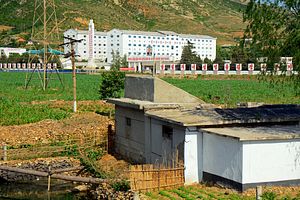TOKYO—Kawasaki Eiko, a second-generation ethnic Korean, grew up in economically devastated post-World War II Japan, hearing stories spun by the government in Pyongyang about the possibility of a bright future in North Korea. At age 17, she made the biggest mistake of her life.
Eiko became one of the approximately 100,000 people who left Japan to join a resettlement program run by North Korea and Japan but promoted and implemented largely by the General Association of Korean Residents in Japan (Chongryon), a pro-Pyongyang organization, between 1959 and 1984.
Arriving in North Korea in 1960 as a participant in the “Paradise on Earth” campaign, she found a desperately poor country where the government repression extended into all realms of daily life. The North Korean government told her where to live, study and work, what to say and how to say it. They rationed her food, and forced her to watch what others did and report back about it. Letters she sent to her family in Japan were censored. She engaged in subterfuge to message to her parents – who were supposed to follow her a year after she arrived – not to come. She wrote she would see them soon after her brother’s wedding. Her brother was in elementary school at the time. “Our lives were taken away from us,” Eiko, 72, told Human Rights Watch. “We wanted to go back home [to Japan] but couldn’t. We could easily die by saying the wrong thing, and it didn’t matter how tough life was, we could not even choose death. If you did, nobody would know what happened to you. It was terrifying, life had no value there. North Korea needs to change, and for that to happen, we need help from the international community.”
It was only in 2003 – 43 years after she first arrived in North Korea – that Eiko finally escaped. She fled on foot by making the dangerous crossing of the North Korea’s northern border with China, and lived there in hiding for a year and a half. When she found out she could contact the Japanese authorities and get back to Japan, she immediately did so and flew from Shenyang to Osaka. She now lives in Tokyo with one of her children.
On March 16, Marzuki Darusman, the United Nation’s Special Rapporteur on the situation of human rights in North Korea, presented his report to the UN Human Rights Council. The report focused on developing strategies to address international abductions, enforced disappearances, and related matters, including how Chongryon’s appealing “Paradise on Earth” campaign contrasted with the situation that Japanese Koreans faced in Japan, where many were living in poverty and constantly victimized by discrimination.
According to Tessa Morris-Suzuki’s book, Exodus to North Korea: Shadows from Japan’s Cold War, “Paradise on Earth” was an internationally coordinated campaign organized by the Japanese and North Korea Red Cross societies and assisted by the International Committee of the Red Cross, which lured thousands of ethnic Koreans living in Japan and their families with false promises to leave their homes and go to North Korea. North Korea immediately broke promises made under the program by denying returnees free and uncensored contact with family members they left behind in Japan.
While it took some time for credible warnings about the situation in North Korea to become known, by 1962 there were enough indications of abuses – from the returnees, from regional news media, and even from a popular book – that the Japanese government should have ceased even tacitly giving the campaign credibility through their facilitation of emigration. Instead, the Japanese government failed to stop the campaign and continued this migration project for two more decades – and has yet to take any steps to right these wrongs.
In January 2015, Eiko and ten fellow returnees who fled North Korea submitted a petition to the Japan Federation of Bar Associations for the protection of human rights regarding the “Paradise on Earth” movement. They accused the Japanese and North Korean governments, Chongryon, the Japanese Red Cross, the Red Cross of North Korea, and the ICRC of participating in the systematic abuse of their human rights. The Federation of Bar Associations has reviewed the petition, and created a group to investigate.
Eiko’s nightmarish experience should be an alarm bell to help the “Paradise on Earth” returnees before it’s too late. It’s been more than 55 years since the start of that campaign, and Tokyo has a last chance to own up to and set right this historical wrong that condemned so many to hell on earth at the hands of the North Korean government.
Kanae Doi is the Japan director of Human Rights Watch.

































